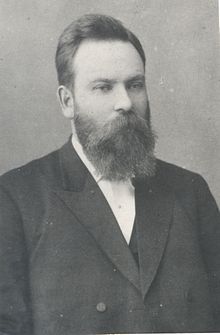Jaan Bergmann
Jaan Bergmann (born December 17 . Jul / 29. December 1856 greg. In Soosaare , rural community of Kolga-Jaani , † June 12 jul. / 25. June 1916 greg. In Paistu ) was an Estonian minister and poet .
Life
Bergmann went to school in Põltsamaa and Tallinn and studied theology at the University of Tartu from 1877 to 1882 . After a year of probation with Jakob Hurt in Saint Petersburg , he was pastor in Paistu from 1884 until his death.
plant
Bergmann began translating poetry into Estonian at high school, mainly from the classical languages and German. As was common at the time, the line between translation, rewrite and poetry became blurred, especially since the sources were often not given. A poem by Bergmann, originally regarded as an original, was only revealed as a translation of a poem by Emanuel Geibel in later literary history .
In general, Bergmann's aim was to show that “one could also write perfectly formed,“ classical ”poetry in Estonian, and this alone shows its significance for the development of the Estonian lyric language. and love poetry, as introduced into Estonian poetry by Lydia Koidula . Bergmann also associates his editorial work with Koidula, as he was the first editor of a comprehensive collection of poems by Koidula. However, he had proceeded very arbitrarily with the edition and had changed content that ran counter to his taste.
Remarkable independent poems by Bergmann can be found in the field of ballads, some of which have become well known through their dissemination in school and reading books. The most famous is the ballad The Faithful Ülo , in which the main character of a besieged city brings the news that help will soon arrive, but dies a hero's death.
As part of his professional activity, Bergmann wrote a lot of religious poetry and re-translated the Bible, but only parts of it have been published.
Translations into German
His ballad Der getreue Ülo is available in German in Wilhelm Nerling's anthology.
bibliography
- Jutud, salmused, laulud, mis wõõraist keeldeist ümbertõlkinud ehk ise luuletanud. (German stories, psalms, songs that have been translated from foreign languages or composed yourself. ) Bergmann, Tallinn 1875.
- Ööwahi uus aasta. (German New Year of the night watchman. ) Heinrich Laakmann , Tartu 1877.
- Koidutäht ja teisi luuletusi. (German Der Morgenstern and other poems. ) Eesti Riiklik Kirjastus, Tallinn 1957.
- Laulud. (German songs. ) 2nd revised and expanded edition, edited by Henrik Visnapuu . Eesti Kirjanduse Seltsi Koolikirjanduse toimkonna kirjastus, Tartu 1923 ( Noorsoo kirjavara. No. 89).
Literature on the author
- M. Veiderman: Jaan Bergmann'i laen Geibel'ilt, in: Eesti Kirjandus 2/1932, pp. 72-74.
- E. Aaver: Kuidas Jaan Bergmann Koidula luuletusi muutis, in: Keel ja Kirjandus 9/1962, pp. 520-530.
- Jaan Bergmanni autobiograafia, in: Keel ja Kirjandus 11/1986, pp. 685–690.
- Toomas Paul: Jaan Bergmann piiblitõlkijana, in: Keel ja Kirjandus 5/1995, pp. 303–311.
Individual evidence
- ↑ Eesti kirjanike leksikon. Koostanud Oskar Kruus yes Heino Puhvel. Tallinn: Eesti Raamat 2000, p. 58.
- ↑ M. Veiderman: Jaan Bergmann'i laen Geibel'ilt in: Eesti Kirjandus 2/1932, pp 72-74.
- ↑ Cornelius Hasselblatt : History of Estonian Literature. From the beginning to the present. Berlin, New York: Walter de Gruyter 2006, p. 303.
- ↑ E. Aaver: Kuidas Jaan Bergmann Koidula luuletusi muutis, in: Keel ja Kirjandus 9/1962, pp. 520-530.
- ↑ Eesti kirjanike leksikon. Koostanud Oskar Kruus yes Heino Puhvel. Tallinn: Eesti Raamat 2000, p. 441.
- ^ Toomas Paul: Jaan Bergmann piiblitõlkijana, in: Keel ja Kirjandus 5/1995, pp. 303-311.
- ^ "The faithful Ülo", in: Estonian poems. Translated by W. Nerling. Dorpat: Laakmann 1925, pp. 49-51.
| personal data | |
|---|---|
| SURNAME | Miner, Jaan |
| BRIEF DESCRIPTION | Estonian pastor, poet and translator |
| DATE OF BIRTH | December 29, 1856 |
| PLACE OF BIRTH | Soosaare |
| DATE OF DEATH | June 25, 1916 |
| Place of death | Paistu |
